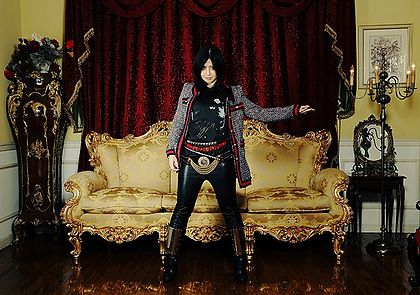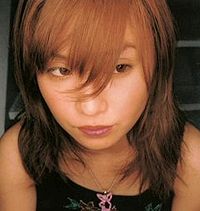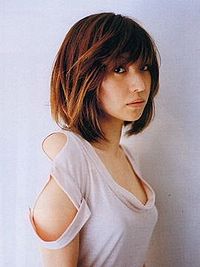You can now "Thank" others for their contributions, set up email and two-factor authentication, and more!
Onitsuka Chihiro

Onitsuka Chihiro (鬼束ちひろ) is a Japanese pop singer-songwriter under For Life Music Entertainment. She is well-known for a string of high profile drama tie-up ballad singles, the most successful of those being "Gekkou" (theme song for TRICK). Onitsuka was originally signed to EMI Music Japan from 2000 onwards, however in 2004 dropped her label and later was switched to Universal Music. After releasing one single on her new label, Onitsuka would go on an extended hiatus until 2007 when she would return to the music scene.
Profile
- Name: Onitsuka Chihiro (鬼束ちひろ)
- Birthday: October 30, 1980
- Birth Place: Nango, Minaminaka, Miyazaki, Japan
- Blood Type O
- Height: 154cm
- Religion: Christian
- Family: Parents, two younger brothers, one younger sister
- Favourite Drink: Coca-Cola
- Favourite Novel: Antoine de Saint-Exupéry's The Little Prince
- Favourite Artists: Alanis Morisette, Amanda Marshall, Bon Jovi, Carole King, Incubus, Jewel, Joni Mitchell, Melissa Etheridge, Paula Cole, Sheryl Crow, Simon and Garfunkel, The Beatles, The Carpenters
Information

Early Days - Insomnia
Onitsuka, since her youth, had been influenced by Western singer-songwriter musicians. She would listen to many Western artists through the interest from her parents such as The Carpenters, though it was US songwriter Jewel's music that inspired her to become a singer of her own. The first song Onitsuka wrote was "call", which she wrote at 17 after being inspired by a play about AIDS. At the time, Onitsuka would write all of her songs in English; however by the time they were recorded the lyrics had been changed into Japanese. After reading an advertisement for a musical audition in De-view magazine, Onitsuka would perform "call" there and would win the grand prix prize for the audition. This lead to Onitsuka being signed to the management team MELODY STAR RECORDS.
After graduating from senior high school in the spring of 1999, Onitsuka would travel to Tokyo to prepare for her debut (by taking voice lessons, etc). In the six months since Onitsuka first arrived at Tokyo, she had written over 60 songs (such as "Shine", "Gekkou" and "We Can Go"). In February 2000, Onitsuka would debut under Toshiba EMI with the single "Shine". However, this single would not chart on the top 200 on Oricon charts.

After a period of six months, a new Onitsuka song was announced. The drama TRICK would start in July 2000, with "Gekkou" as its theme song. The single (which was released in the midst of the drama's run) met with prolonged success (a phenomenon not commonly seen in Japanese music charts which favors extreme first week sales). While in its first week it only reached a position of #30, it would later consistently sell over 20,000 copies for 12 weeks. The drama would run until mid-September, with its final episode showing Onitsuka herself making a cameo and performing "Gekkou" live on location in Okinawa. The single peaked at #11 in late September, and in total would sell approximately 600,000 copies in total.
Onitsuka would follow up this single with a third in November, the variety show Shin-Unnan no Kibun wa Joujou.'s ending theme song "Cage". However, this single would not be as successful, reaching #15 and charting in the top 30 for two weeks. Her fourth single, "Memai / edge", was released on the anniversary of her debut single's release, and would be Onitsuka first single to break the top 10, at the 6th position. "Memai" from this single would go on to win the award for best lyrics at the 43rd Japan Record Awards.
After these four singles, Onitsuka's debut album, Insomnia, would be released. It debuted at #1 on Oricon charts (making this Onitsuka's only #1 product to date) and in total has sold approximately 1,400,000 copies. A song from the album, "Rasen", was later featured in the Hirosue Ryoko-starring internationally distributed film Wasabi as an insert song.
This Armor - Sugar High

Onitsuka's comeback single after the success of her first album was the September single "infection / LITTLE BEAT RIFLE", with "infection" being used as the theme song to the dorama Hyouten 2001. The single suffered a sad fate, as the lyrics of "infection" could be seen to link to the September 11 Terrorism Attacks. Because of this, Toshiba EMI decided to severely cut back the promotion of the song and only promoted the second A-side, "LITTLE BEAT RIFLE". Onitsuka's sixth single "Ryuuseigun" would once again be a drama theme song, for the second series of TRICK entitled TRICK 2. This single would be quickly followed by Onitsuka's second studio album, This Armor.
On Novermber 5, 2002, Onitsuka would hold a large concert at the Nippon Budokan, entitled ULTIMATE CRASH '02 LIVE AT BUDOKAN, which included some songs that had not yet been released. IN December, only nine months after the release of This Armor, Onitsuka would release her third original album, Sugar High. The album, with no single releases was an album filled with a myriad of minor tie-ups (the most major of these being that the song "Castle・imitation" was used as the game Breath of Fire: Dragon Quarter's theme song). Unlike Onitsuka other's albums which had 5 or more PVs, this would only have one (for the song "King of Solitude"). Despite these promotion short-comings, the album still managed to reach #2 on Oricon album charts.
End of Toshiba-EMI Days - Hiatus

Throughout 2003, Onitsuka Chihiro would release four singles. The first of which was the simply arranged "Sign" in May, which was followed in August by a more rock-influenced upbeat track "Beautiful Fighter". However, in September Onitsuka would have to undergo emergency throat surgery and her following two singles saw a stripped back release. The first of these two, "Ii Hi Tabidachi Nishi e" was a cover of the hit song "Ii Hi Tabidachi" by Yamaguchi Momoe with modified lyrics. The song was featured in commercials for Japan Railway, much like the original before it. The second was the theme song to the third series of TRICK, entitled TRICK 3 (called "Watashi to Waltz wo"). The lack of Onitsuka promoting these two singles are evident by their tracklists; "Ii Hi Tabidachi Nishi e" featured "Gekkou" performed live from her ULTIMATE CRASH '02 LIVE AT BUDOKAN DVD (which had been released five months earlier) and "Watashi to Waltz wo" featured a song cut from her third album, Sugar High. Despite this, Onitsuka performed many concerts during this time before falling ill and canceling two concerts.
Two new releases would then be able to be pre-ordered on online shopping sites, to be both released on 2004.03.17. The first was Onitsuka's fourth album (TOCT-25310) and Onitsuka's third PV clip DVD (TOBF-5300). However, soon both these items would be removed from pre-order permanently. Soon, a new item would replace these two at online shopping sites: a 7,000円 Singles BOX collection. Furthermore, a note would appear at Onitsuka's official website that stated that it was not any intention of Onitsuka herself's to release this. This conflict with her record company is said to be the cause of the succeeding split from Toshiba EMI, and later MELODY STAR RECORDS.

In June 2004, Onitsuka was then signed under Sony's music management team, and later in July it was revealed that Onitsuka would be releasing music through the Universal music company. After a new single, "Sodatsu Zassou", was announced, Onitsuka would appear as a surprise guest at the televised Space Shower TV event Sweet Love Shower 2004. There, she would cover the grunge anthem Smells Like Teen Spirit originally sung by Nirvana and also The Police's song King of Pain. Both of these songs were sung in re-arranged, orchestral versions. Onstage, Onitsuka would be adorned with such things as heavy make-up and a more array of clothes. Following this appearance, she would launch into her new single, the heavy rock song "Sodatsu Zassou". Onitsuka was to follow this with an appearance on the music show Bokura no Ongaku on 2004.10.30, but however cancelled this due to poor health. When the "Sodatsu Zassou" single was released it reached to #10 position, despite there being very little promotion for the song at all (including the fact that the song has no PV). Toshiba EMI would, in turn, release a two-set Onitsuka Chihiro best album as well as a complete PV collection in December.
From now on, there would be little news of Onitsuka as she continued her hiatus. However, there were three notable events that occurred during this time:
- On 2005.01.31, Sony Music terminated its management contract with Onitsuka Chihiro. Reputedly this was a compromise met to do with the management of copyright when iTunes opens in Japan (as Sony Music has its own music store)
- On 2005.07.26, Onitsuka was confronted with a stalker who was apprehended after he stood outside of Onitsuka's residence for 30 minutes with a bouquet.
- On 2005.09.06, Toshiba-EMI would release their second consecutive best album from Onitsuka, called SINGLES 2000-2003. The album features all A-side songs during her stay at the Toshiba EMI record company, as well as three bonus songs: a 'summer radio mix' of "We Can Go", the original version of "Castle・imitation" featured in the game Breath of Fire: Dragon Quarter and the cover of Matsutoya Yumi's "Mamotte Agetai" that Onitsuka sung for the tribute album Queen's Fellows: yuming 30th anniversary cover album. The limited edition of this album also featured footage from The Unplugged Show, including the version of "Beautiful Fighter" that was to be featured on Onitsuka's third PV clip collection before its cancel.
Return to the Music Scene

In September 2006, reports that Onitsuka had sung at a preview of the movie Monshen had surfaced. Later in the month, detailed information including photos. The event took place on the 10th of September, where Onitsuka would sing a duet with Tamai Yuumi (seiyuu for the character Lin in Spirited Away) on her band Psalm's song "Umi no Uta" (うみの唄; Song of the Sea).
In the March '07 edition of the magazine ROCKIN'ON JAPAN, it was revealed that Onitsuka Chihiro would return to the music scene full-time. Her songs were produced by Kobayashi Takeshi (producer of Hitoto Yo, Mr. Children, Salyu, etc). Three songs were mentioned in the article, namedly "Angelina"", NOW" and "everyhome". Further information was released by the Hochi Yomiuri: according to her record label (she is still with Universal) Onitsuka had written roughly 10 new songs, and had been recording since spring 2006. "everyhome" was released as her return single in the summer, which received moderate success. Onitsuka's second 2007 single, "Bokura Barairo no Hibi" (September release), features "NOW" as its B-side. This single was followed by the album LAS VEGAS in October, which hit #6 on the weekly Oricon Charts.
Onitsuka took another short leave and returned in October of the next year to release "Hotaru" (蛍), the first of a steady flow of singles. It reached a strong #11 on the weekly Oricon charts. She also released NINE DIRTS AND SNOW WHITE FLICKERS, her 3rd live DVD. In May of the next year she released "X / Last Melody", a double A-side single with the former song being an edgy rock song with slightly distorted vocals, something new for Onitsuka. The single also reached #11 on the Weekly charts. In July she released "Kaerimichi wo Nakushite" (帰り路をなくして), another string-ladden ballad, which reached #13 on the charts. Shortly After, "Kagerou" (陽炎) was released early September. Her 5th studio album, DOROTHY, was released October 28, 2009, peaking at #10 on the Weekly Oricon charts. HARD RED FANTASIA, Onitsuka's next PV clip DVD was to be released on the same day, but was cancelled. On April 28, 2010, ONE OF PILLARS ~BEST OF CHIHIRO ONITSUKA 2000-2010 was announced, which was the first best-of album approved by Onitsuka herself. HARD RED FANTASIA was also re-announced, set for a June 30, 3010 date. ONE OF PILLARS peaked at #13 on the Oricon charts, and with little promotion and only one new song, showed the lowest sales of Onitsuka's career. A collaboration with SoulJa was released on June 16, 2010, "Gekkou ~GOD'S CHILD~".
Assault and FOR LIFE MUSIC ENTERTAINMENT
On September 9, 2010 it was officially announced that Onitsuka had been assaulted a month prior in her apartment by her new boyfriend, Yusuke Komiya. Komiya had a history of violence, and was reportedly intoxicated during the incident which happened on August 18, 2010. By the end of September, he was found and arrested. His trial began December 16, 2010, and he was later sentenced to two and a half years of imprisonment. Onitsuka suffered injuries to her face and broken ribs, but despite this was reported to be finishing up her next album. On February 28, 2011 it was announced that her contract with Universal Music had ended, and Onitsuka was now signed under For Life Music Entertainment. Her next single and album were also announced, "Aoi Tori" and Ken to Kaede respectively. In addition, a 25-page interview with Papyrus magazine was released in the month, and her first autobiographical book entitled "Tsuki no Hahen" would coincide with her album release. Ken to Kaede reached #16 on the weekly Oricon charts, with little promotion. Throughout May, Onitsuka's artwork was featured in and exhibition entitled THE BUNNY AND THE PYTHON at Sundaland Cafe in Shibuya. In October, another exhibition was held in the same location, this time called WHOLE MONSTER PUNKS.
At the end of November, Onitsuka started a three date tour titled HOTEL MURDERESS OF ARIZONA ACOUSTIC SHOW, which was later released on March 14, 2012 on DVD. At that time, it was also announced that Onitsuka would be releasing her first cover album, FAMOUS MICROPHONE. It featured exclusively English songs, including some of her past covers sung during tours, and one original song. The album was released on May 30, 2012.
Setlist Tracks
Many songs of Onitsuka's have solely been performed live and do not appear on any CD release of hers. The names of some known the tracks are:
- "Angels Would Fall" (Melissa Etheridge cover, performed at "Live VIBE 2002" tour)
- "Because the Night" (Patti Smith cover, performed at RISING SUN ROCK FESTIVAL 2001 in EZO)
- "Desperado" (The Eagles cover, performed at HMV instore lives (2000))
- "Let It Rain" (Amanda Marshall cover, performed at "Chihiro Onitsuka Live Tour 2001")
- "Foolish Games" (Jewel cover, performed on NHK TV Show Top Runner 2001.09.21)
- "King of Pain", (The Police cover, performed at "Sweet Love Shower 2004")
- "One of Us" (Joan Osbourne cover, performed at "Ultimate Crash '02". Does not feature on ULTIMATE CRASH '02 LIVE AT BUDOKAN DVD)
- "On The Bus" (original song, referenced in music magazine ROCKIN'ON JAPAN)
- "Seishun no Kage" (青春の影; Shades of Youth (TULIP cover, performed at "Jive the Keys" 2003.06.01)
- "Smells Like Teen Spirit", (Nirvana cover, performed at "Sweet Love Shower 2004")
- "Take Me Home, Country Roads" (John Denver cover, performed at "Unplugged Show '03", Suntory Hall 2003.08.19)
- "Time After Time" (Cyndi Lauper cover)
- "Try to cry" (original song, featured in CRADLE ON MY NOISE LIVE DVD)
- "You Gotta Be" (Des'ree cover, performed at "Chihiro Onitsuka Live Tour 2001")
- "You Were Meant for Me" (Jewel cover, performed at "Live Vibe 2002" tour)
Discography





Studio Albums
- [2001.03.07] Insomnia (インソムニア)
- [2002.03.06] This Armor
- [2002.12.11] Sugar High
- [2007.10.31] LAS VEGAS
- [2009.10.28] DOROTHY
- [2011.04.20] Ken to Kaede (剣と楓; Sword and Maples)
Best Albums
- [2004.03.17] Singles BOX (シングルBOX)
- [2004.12.01] the ultimate collection
- [2005.09.06] SINGLES 2000-2003
- [2010.04.28] ONE OF PILLARS ~BEST OF CHIHIRO ONITSUKA 2000-2010
- [2013.12.18] GOODBYE TRAIN ~ ALL TIME BEST 2000-2012
Cover Albums
- [2012.05.30] FAMOUS MICROPHONE
Singles
- [2000.02.09] Shine (シャイン)
- [2000.08.09] Gekkou (月光; Moonbeam)
- [2000.11.08] Cage
- [2001.02.09] Memai / edge (眩暈; Dizzyness)
- [2001.09.07] infection / LITTLE BEAT RIFLE
- [2002.02.06] Ryuuseigun (流星群; Meteor Shower)
- [2003.05.21] Sign
- [2003.08.20] Beautiful Fighter
- [2003.10.29] Ii Hi Tabidachi Nishi e (いい日旅立ち・西へ; Departure on a Fine Day, for the West)
- [2003.11.27] Watashi to Waltz wo (私とワルツを; Waltz with Me)
- [2004.10.27] Sodatsu Zassou (育つ雑草; Pulling Weeds)
- [2007.05.30] everyhome
- [2007.09.19] Bokura Barairo no Hibi (僕等 バラ色の日々; Everyday is Rose Coloured for Us)
- [2008.08.06] Hotaru (蛍; Firefly)
- [2009.05.20] X / Last Melody (ラストメロディー)
- [2009.07.22] Kaerimichi wo Nakushite (帰り路をなくして; Losing My Way Home)
- [2009.09.02] Kagerou (陽炎; Heat Haze)
- [2011.04.06] Aoi Tori (青い鳥; Blue Bird)
- [2013.03.11] Itazura Pierrot (悪戯道化師 (いたずらピエロ); Mischievous Pierrot)
- [2013.12.18] The Silence is Mine / Anata To SciencE (あなたとSciencE)
Video Releases
- [2001.04.11] ME AND MY DEVIL
- [2001.11.07] CRADLE ON MY NOISE LIVE
- [2002.12.11] PRINCESS BELIEVER
- [2003.05.21] ULTIMATE CRASH '02 LIVE AT BUDOKAN
- [2004.12.01] the complete clips
- [2008.08.06] NINE DIRTS AND SNOW WHITE FLICKERS
- [2010.06.30] HARD RED FANTASIA
- [2012.03.14] HOTEL MURDERESS OF ARIZONA MY GUN
Other Video Releases
- [2009.02.25] Live & Documentary DVD "ap bank fes '08" (Disc 1 #7 everyhome)
Compilations / Other
- [2000.09.06] TRICK Original Soundtrack (#15 Gekkou]] (Solo Piano), #24 Gekkou]] ~TV86~)
- [2001.01.01] NOW JPOP 2001 (#7 Gekkou)
- [2001.09.07] Hyouten Original Soundtrack (#4 traces, #9 infection -piano- ~motif of infection~, #19 infection]] -viola- ~motif of infection~)
- [2002.05.29] THE JAPAN GOLD DISC AWARD 2002 (#4 Gekkou (album version))
- [2002.12.11] Queen's Fellows: yuming 30th anniversary cover album (#1 Mamotte Agetai)
- [2002.12.21] Breath of Fire V Dragon Quarter OST (Disc 2 #41 Castle・imitation (Breath of Fire V Dragon Quarter))
- [2003.03.05] Sweet -for emotional memories- (#5 Gekkou)
- [2004.03.24] Hit Hit March 2004, Sekai ni Hitotsu Dake no Hana~Ii Hi Tabidachi Nishi e (#2 Ii Hi Tabidachi Nishi e)
- [2004.04.23] OUR LAST DAY -CASSHERN OFFICIAL ALBUM- (#7 BORDERLINE)
- [2005.03.30] VENUS JAPAN (#8 Sign)
- [2006.06.07] 39 (THANK YOU) (#3 Ii Hi Tabidachi Nishi e)
- [2007.04.04] L25 (#6 Sign)
- [2007.11.07] TEARS ~J-POP SELECTION~ (#6 Ryuuseigun)
- [2008.01.16] H2O (#13 Gekkou)
- [2008.05.21] First Kiss - 15 Special Love Songs (#8 Memai)
- [2009.03.04] I ~Zutto, Zutto, Aishiteru~ (#12 Ryuuseigun)
- [2009.03.18] Omoi Uta ~ Utahime Yell Songs (#5 Watashi to Waltz wo)
- [2009.03.25] Yesterday Once More ~TRIBUTE TO THE CARPENTERS~ (#1 I NEED TO BE IN LOVE)
- [2009.10.21] tabiuta -Tabi e Uta wo- ~Tetsu Tabi Girls recommend~ (#14 Ii Hi Tabidachi Nishi e)
- [2010.04.28] HOLIDAY tunes ~Ouchi Mode~ (Disc 1 #4 Memai)
- [2010.05.05] TRICK 10th Anniversary Memorial Soundtrack (Disc 1 #23 Gekkou, Disc 1 #24 Ryuuseigun, Disc 1 #25 Watashi to Waltz wo)
- [2010.06.16] SoulJa - Letters (Disc 1 #3 Gekkou ~GOD'S CHILD~ feat. Onitsuka Chihiro)
- [2011.06.08] PORTRAIT RED (#6 Gekkou (album version))
- [2011.10.05] Utahime Premiere -White- (Disc 1 #6 Memai)
- [2011.10.26] Sweet 30 Covers ~Utahimetachi ni Yoru Yogaku Cover Best Selection~ (Disc 1 #1 I NEED TO BE IN LOVE)
- [2012.05.02] KING OF SONGWRITER ~SONGS OF KIYOSHIRO COVERS~ (#2 Tsuki Aitai)
- [2012.10.03] Yamaguchi Momoe Tribute Selection (#10 Ii Hi Tabidachi Nishi e)
Works
Lyrics
- [2002.09.11] PE'Z - Kugatsu no Sora (#11 Amny)